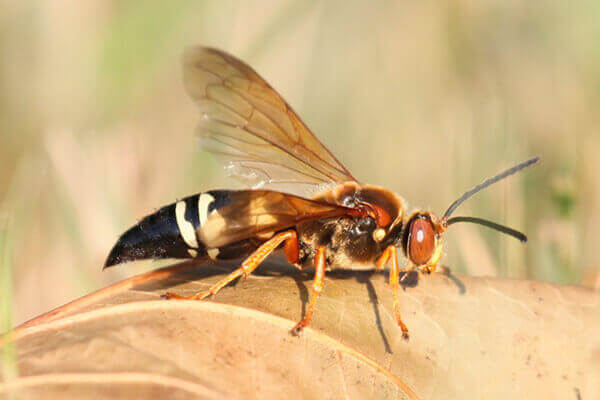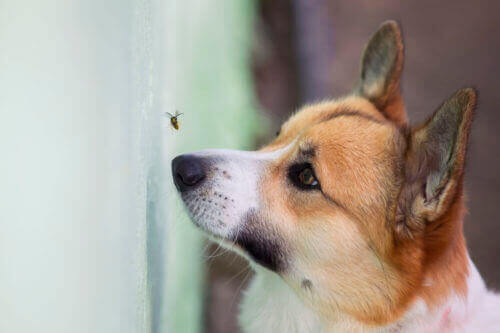Cicada Killer Facts & Information
Everything you need to know about cicada killers
What Do Cicada Killers Look Like

Cicada killers are a very hearty wasps that tend to grow very large in size. Cicada killers are black with some yellow markings or stripes. Their wings are a shaded brown, and their legs can vary from pale red to a more vibrant orange. Their eyes can be black or red and are set far apart on their head. A cicada killer exterminator can not only help but they should be able to bring a Board Certified Entomologist with them to make sure you are dealing with cicada killers and not honeybees. Then you can get started on cicada killer removal.
Cicada killer tunnels usually have a distinctive U-shaped collar of loose soil around the opening. Individual tunnels are can range from 30- to 70-inches long and may run 12- to 15-inches below the surface. The first chamber is about a foot or so from the entrance. There are an average of 15 egg-shaped side chambers an a tunnel, each containing 1 to 3 paralyzed cicadas and an egg which hatches in 2 to 3 days. The grub-like wasp larva feeds for about 10 days, leaving only the cicada’s outer shell. During the fall, the larva spins a silken case, shrinks, and prepares to overwinter. Development will be completed when wasps emerge next summer. There is one generation each year.Not the wasp you have?
Cicada killer tunnels usually have a distinctive U-shaped collar of loose soil around the opening. Individual tunnels are can range from 30- to 70-inches long and may run 12- to 15-inches below the surface. The first chamber is about a foot or so from the entrance. There are an average of 15 egg-shaped side chambers an a tunnel, each containing 1 to 3 paralyzed cicadas and an egg which hatches in 2 to 3 days. The grub-like wasp larva feeds for about 10 days, leaving only the cicada’s outer shell. During the fall, the larva spins a silken case, shrinks, and prepares to overwinter. Development will be completed when wasps emerge next summer. There is one generation each year.Not the wasp you have?
How Did I Get Cicada Killers?
Cicada killers are solitary wasps that choose sites with specific characteristics: well-drained, light-textured soils in full sunlight that are near trees harboring cicadas. They may dig along sidewalk or patio edges, in flower beds, gardens, or lawns. So, if you have things like this around your house, then you probably have cicada killers, too. As much as 100 cubic inches of soil may be brought to the surface as tunnels are formed. This can be unsightly, and the accumulations can smother grass causing those lawn bald spots you may be seeing. Sometimes skunks may dig up areas that have been extensively tunneled by the wasps to feed on cicadas and wasp larvae.

Some dogs and cats may catch cicada killers but usually only once. Those that pick females probably will be stung, remember it, and associate the experience with the buzzing sound and warning colors. Some may have a severe reaction to the venom, especially if stung in the mouth. If that is suspected, take your pet to the veterinarian immediately. Wasp flight begins in early morning and can continue until dusk. Wasps remain in their burrows at night so encounters can be avoided by managing the activity of your pets. The best way to manage it is to have cicada killer pest control services done around your home.
Problems Caused by Cicada Killers
While only the females can sting and they rarely do, when they do get angry enough. Luckily their stings are not painful. Females have significant stingers which they plunge into cicadas to inject venom that paralyzes them. Without doubt, their stings are painful. However, they are not aggressive and do not have nest-guarding instinct of honeybees and hornets. You can walk through areas where they are active without attracting attention. Cicada killers seek sandy, bare patches of ground in full sun for making their burrows, it’s common for someone mowing their lawn to run across a cicada killer burrow and rile them up. We know what to look for and how to provide you with cicada killer treatments to achieve ultimate cicada killer control.
How Do I Get Rid of Cicada Killers?
Cicada killers may dig in the loose soil in vegetable gardens or flower beds. A burrow at the base of a plant may disrupt its root system. If only a few plants are affected, drenching the area around their bases with water is probably the best approach. The wasps do not like wet soil so they may abandon the site. Watering the plants thoroughly will settle soil back around the roots giving them a chance to survive. Do not drench soil around plants with an insecticide mix because it may damage the roots and/or result in a residue in the plant. Cicada killers may begin to dig in sandy areas on playgrounds or in golf course sand traps. If practical, keep these areas wet or regularly churn the sand to discourage wasps from establishing their tunnels.
WHY OPC FOR CICADA KILLER REMOVAL
We’re passionate about keeping you safe from cicada killers because we live and work here – it’s our neighborhood, too. With our years of experience keeping homes and businesses in Louisville, Shelbyville, Frankfort, Lexington, Southern Indiana, and surrounding areas safe from pests, OPC has the experience you can trust.
Expert pest control since 1972
Quality Pro certified company
Satisfaction guarantee
Say goodbye to cicada killers.
GET MY QUOTE
“I have been with OPC for over 15 years for both my residential and commercial properties. Dave and Chris are excellent technicians. They are very knowledgeable about the business and customer service!!!”
, IN